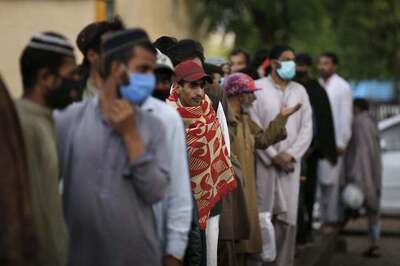
views
The ongoing Russia-Ukraine crisis has become one of the most critical events in international relations making it extremely important for UPSC civil services exam — both from prelims and main perspectives. From the examination point of view, the key is to look at the ongoing events as well as interlink them with static subjects to be prepared in a holistic manner.
Ukraine, Russia War: What to Prepare For Prelims
From Prelims’ perspective, rather than looking at the dynamics of the crisis students need to remember the associated geopolitics and international organizations.
One of the reasons for Russian aggression has been the expansion of the US-led cold war military alliance, the North Atlantic Treaty Organization (NATO), into Easter Europe.
Since the breakup of the USSR and the collapse of the Warsaw Pact, NATO has undergone rounds of expansion including several former states with the students should take note of them.
Further students should also familiarize themselves with other important regional and international organizations associated with the countries involved in the crisis including European Union, Eurasian Economic Union, Organization for Security and Co-operation in Europe (OSCE), agreements Minsk I and II as well as the Normandy Format of dialogue (consisting of France, Germany, Ukraine, and Russia) that have been attempting to resolve the conflict.
Another important area to focus on prelims perspective is the geographical importance of the region. UPSC tends to ask questions on the geographical features of places in the news in prelims.
Students should focus on the region of the Caucasus lying between the Black Sea and Caspian sea, countries comprising the region which include the former Soviet states of Russia, Armenia, Azerbaijan, and Georgia, the importance of Crimea, the strategic significance of Sevastopol port and naval base, climatology and crucial maritime features.
The southern regions of Georgia- South Ossetia and Abkhazia which witnessed Russian intervention in 2008 and the eastern districts of Luhansk and Donetsk in Ukraine that were the flashpoints of the present crisis should also be remembered as direct questions regarding their location may be asked.
Given the West’s response which has been led by economic sanctions, students should be aware of the features and significance of the global financial network- Society for Worldwide Interbank Financial Telecommunication (SWIFT) based in Belgium and overseen by the G-10 Central Banks that Russia has been cut off from as well as the alternative international financial messaging system developed by Russia- System for Transfer of Financial Messages (SPFS) to replace SWIFT.
Another notable topic for Prelims is the Nord Stream 1 and Nord Stream 2, systems of offshore natural gas pipelines in Europe that run from Russia to Germany. Students also should remember certain important strategic points of the India-Russia relationship such as the S-400 deal and Operation Ganga to evacuate Indian nationals stranded in Ukraine for the Prelims exam.
Ukraine, Russia War: What to Prepare For Mains?
With respect to Mains, the topic is crucial for General Studies Paper 2 which consists of international relations.
Candidates need to be aware of the timeline of the crisis and its impact on global politics particularly the human rights and security crisis as well as how it impacts India’s interests.
Here students should keep in mind the steps in the United Nations Security Council and General Assembly as well as India’s response to the same including the statements by India’s Permanent Representative to UN, Ambassador T.S. Tirumurti, focusing on the importance of international order and the importance of dialogue for dispute resolution.
Emphasizing on the co-existence of pragmatism and tradition of Gandhian peace and non-violence, India’s stand needs to be analyzed as also a measure to balance its Western and Russian allies while securing its national interests.
Apart from a direct question in GS 2, indirect questions may also be asked with respect to the world’s physical geography pertaining to the region in GS1 and debates overvalues of democracy and perpetual peace, politics of nuclear weapons, refugee crisis, the failure of human rights norms and related ethical issues for GS 4. The crisis can also be important for an Essay in which topics related to global governance, changing world order, and the need for new international regimes may become important themes.
Another crucial aspect of Mains is the optional paper and students of Political Science and International Relations especially need to keep tabs on the developing issue along with interlinkage with static theories and concepts.
The ideas of “Russkiy Mir” or “Russian World” and the ‘limited sovereignty’ thesis by Russian leaders like Putin and Lavrov can be associated with the larger topic of sovereignty in Paper 1 and Paper 2.
The Ukraine crisis can be effectively associated with the resurgence of realism, particularly offensive realism and the concept of the security dilemma and deterrence in section A of paper 2 of PSIR which deals with international relations.
It is also associated with changing polarity in global politics, the advent of revisionist powers like Russia and China, and how it impacts the existing world order.
Students can also co-relate the inability of the United Nations Security Council to take concrete steps to dissuade Russia with the inherent structural flaws in the organization and the need to reform it.
For Section B, paper 2 of PSIR which deals with India’s foreign policy, students need to analyze how the ongoing crisis impacts India’s interests and the role India can play as a responsible power in the world order. Importantly, the Indian response can be fit in the ongoing tilt in India’s foreign policy from idealism to realism along with a move to what MEA Jaishankar and former Foreign Secretary Vijay Gokhale term as “issue based alignment” instead of non-alignment.
The crisis can also be analyzed using Kautilya Mandal theory where in transforming global politics, new ‘vijigishus’ are emerging to establish their power and counter US hegemony in international politics.
— Written by Prerna Trehan, Academic Director- Political Science and International Relations at Sleepy Classes
Read all the Latest Education News and Breaking News here


















Comments
0 comment